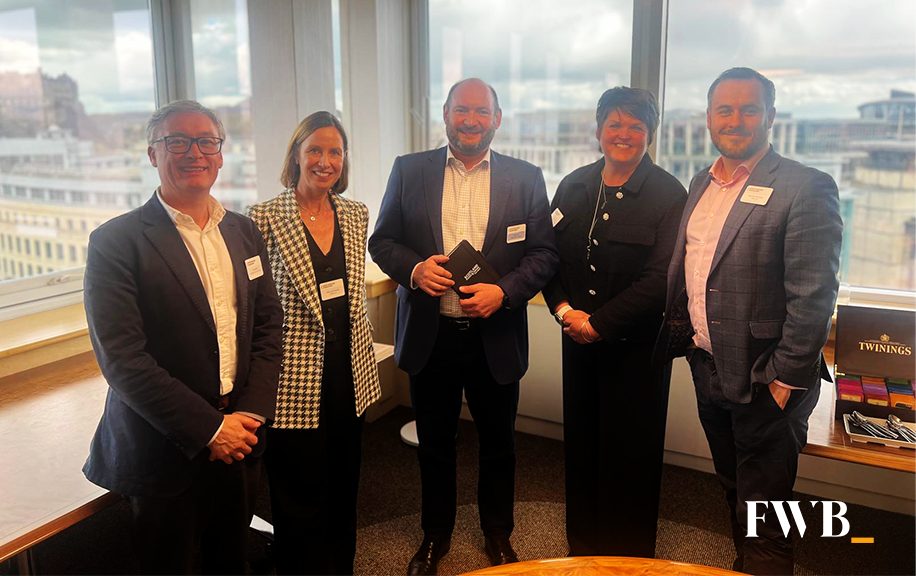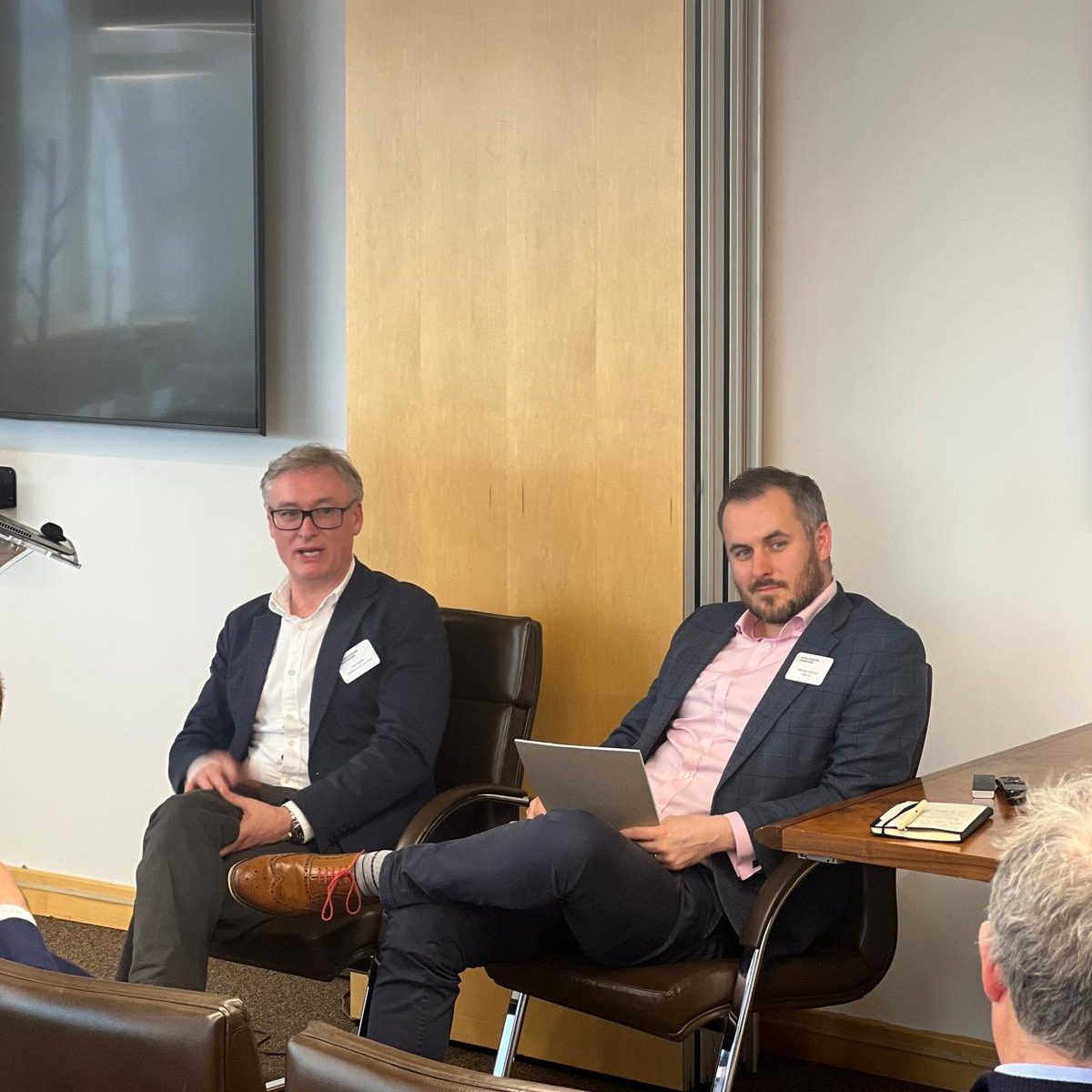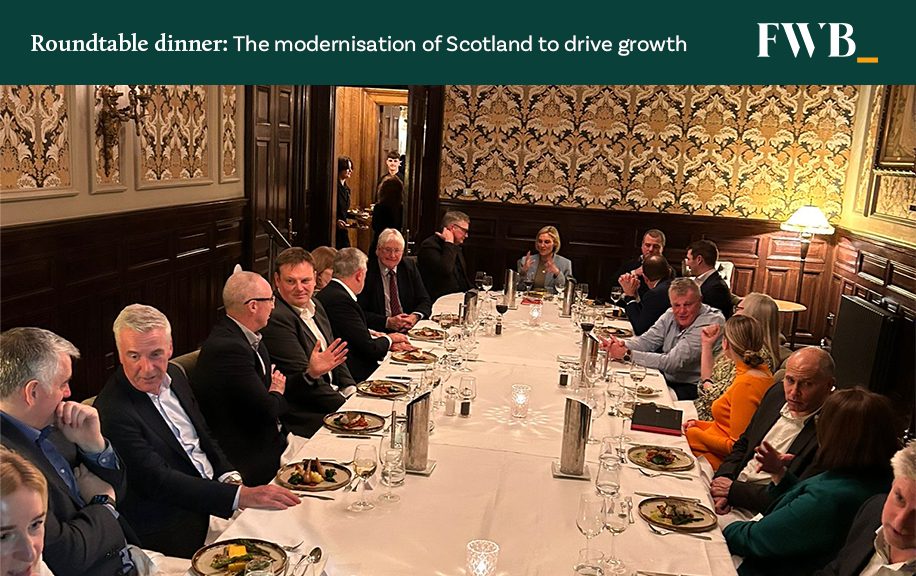Contact the team at FWB to discuss your individual or company requirements, or to discover more about our specialist services.
Navigating Disruption: Insights from Scotland’s Food and Drink Leadership Lunch
24 April 2025
- FWB Events

Last week, FWB, in collaboration with Addleshaw Goddard, hosted our latest Food and Drink Leadership Lunch, bringing together some of Scotland’s most influential voices across the food and drink industry for an afternoon of insight, reflection, and forward-looking discussion. The event featured Iain Baxter, CEO of Scotland Food & Drink, as the keynote speaker, and was chaired by Michael Dickson of FWB and Andy Ley, Partner at Addleshaw Goddard, who welcomed leaders from across the industry including producers, manufacturers, investors, advisors, retailers, and exporters.
Under Chatham House Rules, the debate and conversation was wide-ranging and some of the interesting topics and takeaways included:
- “Disruption is the new normal” – Disruption is now a defining feature of the food and drink sector, with leaders acknowledging that ongoing geopolitical tensions, inflation, and supply chain shocks have made volatility a constant rather than an exception. The idea of returning to ‘business as usual’ feels increasingly outdated, prompting a shift in mindset across the industry. In this context, the need for calm, commercially astute, and resilient leadership is more critical than ever—leaders who can navigate uncertainty while identifying opportunities amidst the turbulence.
- Supply chain resilience is critical – Volatility, raw material access, and logistics pressures have led to organisations de-risking supply chain volatility by diversifying suppliers, investing in local sourcing, and leveraging digital tools for real-time visibility and forecasting. Many are adopting automation and smart technologies—like AI-driven logistics, robotic processing, and predictive maintenance—to boost resilience and efficiency.
- Labour shortages remain acute – Labour shortages continue to challenge the food and drink sector, particularly in rural and production-intensive areas where recruitment and retention are most acute. Industry leaders called for more joined-up, long-term strategies—spanning education, apprenticeships, and targeted immigration policy—to address structural gaps in the workforce. There is growing recognition that solving these issues is not just about filling roles, but about positioning the sector as an attractive, future-focused career choice in Scotland.
- Costs as a barrier entry on innovation – Smaller and lower-margin food and drink businesses are struggling to keep pace with innovation and automation due to mounting cost pressures. Rising national insurance contributions, surging energy prices, and broader inflation are forcing many to divert funds away from long-term efficiency gains toward immediate operational survival. As a result, investment in digital transformation and automation—key to future resilience, differentiation and competition—is often deprioritised, widening the gap between agile market leaders and those fighting to stay afloat.
- Consolidation raises concerns – Consolidation in the food and drink sector is accelerating, driven by rising costs, margin pressures, and the need for scale. While M&A can unlock efficiencies and expand market reach, there’s growing concern about larger corporates using their capital strength to pursue opportunistic or predatory acquisitions. This dynamic risks reducing diversity and local ownership unless growth is guided by long-term, responsible investment principles.
- Policy clarity is urgently needed – From food traceability to Extended Producer Responsibility and Deposit Return Schemes to Trump’s trade tariffs, a more predictable and aligned regulatory environment—between UK and Scottish governments as well as international trade partners—was seen as essential to investor and business confidence.
- Don’t waste a good crisis – The room agreed that disruption can however be a powerful driver of progress. Whether it is a reason to look closer at the cost base and an ‘excuse’ to drive efficient restructuring, or whether it created market opportunities amongst the competition it was agreed that anyone sitting on their hands and waiting for ‘clarity’ would fall behind and miss opportunities.
In his keynote and his response to much of this debate and questioning, Iain provided a comprehensive update on Scotland Food & Drink’s mission, outlining the delivery of the second year of its strategic plan—a framework focused on resilience, growth, and sustainability. With over 60 active projects millions invested, the strategic plan now in its second year is showing real results across eight strategic enablers:
- Market Growth
- Policy and Regulation
- Supply Chain Security
- Innovation and Technology
- People and Entrepreneurial Skills
- Net Zero & Environmental
- Access to Capital
- Infrastructure

Iain underscored that the vision is not just about ambition but action and that Scotland Food and Drink are not passive observers but instead that they are “directly intervening in the market to support businesses and shape the operating environment at every level.” This includes coordinated lobbying of both the UK and Scottish governments on behalf of the sector and taking the feedback and challenge from their members and events like this back into the conversations they are having on behalf of the sector.
Pamela Scott, the new Chair of Scotland Food & Drink, closed the event with an energising call to action, emphasising the power of Scotland’s collaborative ecosystem and community, the provenance and brand that ‘Scotland plc’ has and that even in tough times growth is possible, highlighting it is often when the most innovation is seen.
The event reinforced that Scotland’s food and drink sector is at a critical crossroads—facing structural headwinds, but also rich with potential. With resilient leadership, customer centric strategies, sustained investment, and a shared sense of purpose, the sector can not only adapt but continue to be one of the UK’s leading industries.
FWB and Addleshaw Goddard thank all attendees for contributing to a dynamic and forward-thinking conversation. We look forward to continuing this important dialogue and supporting the next chapter of growth for Scottish food and drink.






